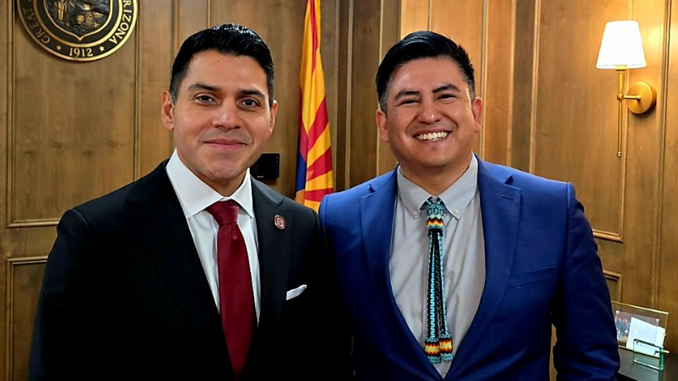
by Staff Reporter | Feb 17, 2026 | News
By Staff Reporter |
The state’s audit of Maricopa County’s annual financial report found significant reporting weaknesses.
The review raised concerns over the state of the county’s IT security systems and data maintenance. Some of these recommendations aren’t new — some were areas the auditor general had recommended in the last two fiscal years.
The auditor general’s office issued their audit on last week which addressed the county report for the 2025 fiscal year released in December.
Their review found that the county had significant deficiencies in internal control, characterized as less severe than material weaknesses, which would justify the reasonable possibility that a material misstatement of basic financial statements wouldn’t be prevented or detected and corrected on a timely basis.
The report focused on two financial statement findings that may have the potential to harm county operations, IT systems, and data.
Firstly, the auditor general found that the county’s administration and IT management had an inadequate process for identifying, classifying, and inventorying sensitive information requiring stronger access and security controls. This was found to be due to the county’s failure to fully integrate its new data classification policy across all applications and financial systems.
The auditor general recommended a complete implementation of policies and procedures to manage IT systems and data risks, and an identification, classification, and inventory of information requiring stronger access and security controls.
Secondly, the auditor general found insufficient development, documentation, and implementation to IT systems and data risks. The county showed it had poor procedures incapable of preventing or detecting unauthorized or inappropriate IT systems and data access, along with ensuring securely maintained configuration settings.
The county also lacked controls for its IT security policies and procedures intended to prevent unauthorized or inappropriate access or use, manipulation, damage or loss. Furthermore, the county’s contingency plan lacked key elements for operations restoration in the event of a disaster or system interruption.
With this second set of problems, county administration and IT management attributed shortcomings to partial implementation and failure to fully implement established procedures concerning logical access restrictions, changes to policies and procedures managing configurations and changes, system activity monitoring for users with administrative access privileges, and the disaster recovery plan.
The auditor general recommended the county monitor all employees’ adherence to access and contingency-planning IT policies and procedures, not to mention develop, document, and implement IT policies and procedures for configuration. With their suggested review, the auditor general recommended restricting access to IT systems and data, creating processes for proposed security impact changes, performing proactive key user and system activity logging and log monitoring, and testing a contingency plan.
For both problems discovered, the auditor general’s office stressed creating internal controls that follow a credible industry source, suggesting the National Institute of Standards and Technology.
In its response to the audit, the county said, in brief, that it would address and implement the findings by June 30 of this year, about a month before the primary election is scheduled to occur. The county didn’t elaborate at length on its plans to remedy the two problems presented by the auditor general’s office.
AZ Free News is your #1 source for Arizona news and politics. You can send us news tips using this link.

by Ethan Faverino | Feb 17, 2026 | News
By Ethan Faverino |
The Arizona House of Natural Resources, Energy, and Water Committee held a special hearing on last week to examine the Arizona State Land Department (ASLD) and advance legislation aimed at its continuation, improved administration, and the siting of utility-scale wind and solar energy projects near residential communities.
In a sweeping action, lawmakers advanced all 16 bills on the agenda, demonstrating strong, unified momentum to reform persistent operational and cultural problems within the department.
HB 2426, which mandates the development and adoption of a required five-year disposition plan for state trust lands, was adopted as an amendment to HB 2150, the primary continuation bill for the ASLD.
Sponsored by Rep. Gail Griffin (R-LD19), HB 2150 repeals the department’s prior sunset date and continues its operation until July 1, 2030, with the repeal of related statutes effective January 1, 2031. The measure requires a two-year hearing, quarterly updates to the Legislature, and compliance with existing statutes mandating a five-year disposition plan under ARS § 37-331.03.
“The State Land Department is not a constitutional agency. The Legislature created the Department, and the Legislature can set guardrails to ensure the highest and best use of land,” stated Chairman Gail Griffin in a press release addressing the issues at the ASLD. “For years, the Department has failed to keep land and housing development moving with consistent long-term disposition planning and predictable decisions. That means less trust revenue for classrooms and fewer lots available for homes.”
ASLD manages approximately 9.2 million acres of state trust land, with a statutory mandate to prioritize the highest and best use to generate maximum revenue for 13 trust beneficiaries, primarily K-12 public schools.
However, recent audits—including the 2025 performance audit and sunset review by the Auditor General—along with multiple legislative hearings and recommendations from the Joint Committee of Reference, have highlighted persistent problems.
These include a lack of consistent long-term planning, unresolved pending applications without final decisions, unwritten regulatory processes and procedures, lost revenue opportunities, due-process concerns, and unnecessary strain on Arizona’s housing supply amid land scarcity and rising costs.
Effective management of state trust lands directly impacts housing affordability and education funding. The Department could immediately alleviate pressures by accelerating sales and leases of suitable parcels, increasing available land for residential development, and generating sustained revenue for schools without new taxes.
Yet reports indicate practices such as withholding land from public auction and canceling leases without replacement tenants, while the Hobbs administration is actively devaluing urban-adjacent land to favor utility-scale solar development near residential areas.
“This is not complicated,” added Griffin. “Arizona’s high-tech economy requires new affordable rooftops for workers, and Arizona’s schools depend on trust returns from the sale of available trust parcels. The Department can improve housing supply and education funding today by selling more land and ending the internal practices that keep projects stalled.”
The sunset review process provides the Legislature with significant leverage to enforce accountability and measurable change. During the hearing, committee members questioned the Governor’s appointed Land Commissioner on fundamental Department functions, processes, and documentation. Responses were often inadequate or nonexistent—raising concerns about leadership after three years in that role.
Senate Natural Resources Committee Vice Chairman Tim Dunn (R-LD25) echoed the call for reform. “The current administration didn’t create these problems, but it certainly inherited them. Now the burden is on the current commissioner to change the culture and redirect the agency in the right direction. The agency needs oversight, but the Department has an opportunity to make a meaningful difference for the state. A positive change could bring in millions of dollars of additional revenue for the trust.”
“Arizona House and Senate Republicans are unified in our understanding of the issues and of the breadth of changes that are needed,” added Senator Dunn. “Based on the clear recommendation of the Joint Committee of Reference, I think it’s safe to say that the Department will not be receiving a clean continuation, and that any continuation the Department receives will be contingent on significant improvements codified in law.”
HB 2426 requires the State Land Commissioner, within two years of the act’s effective date, to complete the five-year disposition plan, adopt written policies for updating it every five years, establish procedures for using the plan to guide public auctions, and submit copies to legislative leadership.
The bill’s legislative findings highlight years of inaction, noting the department’s failure since 2016 to produce the required plans and the fact that all five positions on the advisory Urban Land Planning Oversight Committee have remained vacant since 2018.
Ethan Faverino is a reporter for AZ Free News. You can send him news tips using this link.

by Matthew Holloway | Feb 17, 2026 | News
By Matthew Holloway |
Arizona Senate Majority Whip Sen. Frank Carroll (R-LD28) is advancing legislation to restrict unauthorized individuals from operating commercial vehicles in the state, giving law enforcement officials the authority to demand proof of lawful presence and to impound trucks when drivers cannot demonstrate legal status. The move responds to high-profile, deadly crashes involving commercial drivers who were illegally in the U.S.
The bill received a “Do Pass” recommendation from the Military Affairs & Border Security (MABS) Committee on February 9 by a 4–3 vote, with only Republican support, moving the proposal forward in the legislative process.
Senate Bill 1511, sponsored by Carroll, would require anyone operating a commercial vehicle in Arizona to provide evidence of lawful presence in the United States. Under the proposal, licenses issued by other states or foreign countries would not qualify as proof of lawful presence for commercial operation in Arizona.
SB 1511 would empower law enforcement officers to impound commercial vehicles when a driver cannot provide the required proof of authorization to be in the country. Vehicle owners, not the state, would be responsible for all costs associated with impoundment under the bill’s provisions.
According to Carroll, the legislation is intended to mitigate the risk of deadly crashes involving drivers who are not legally present in the U.S. The Senate press release cited recent incidents, including a February crash in Indiana involving a driver who was an unauthorized immigrant and holder of a commercial driver’s license issued in Pennsylvania that resulted in the deaths of four people, as well as a case involving Rajinder Kumar, who was issued a CDL in California and later killed two newlyweds returning from their honeymoon.
In a statement issued last week, Carroll said: “Arizona cannot afford to wait for another preventable tragedy. This bill is about saving lives and holding everyone on our roads accountable. Americans are dying because illegal drivers are being licensed to operate massive commercial trucks. Rajinder Kumar, an Indian national who illegally entered the US from Mexico, was issued a CDL license in California and later killed two newlyweds returning from their honeymoon. This could happen here if we don’t act. With this bill, Arizona will not allow unqualified or illegal drivers on the road. Law enforcement will have the tools to act immediately, families will be safer, and our roads will be protected. This legislation turns tragedy into action. Arizona is drawing a line: the safety of our citizens comes first, and we will not wait for another senseless death to take action.”
Carroll’s press release stated the goal is to “prevent tragedies before they happen and to protect Arizonans on our roads.”
Matthew Holloway is a senior reporter for AZ Free News. Follow him on X for his latest stories, or email tips to Matthew@azfreenews.com.

by Staff Reporter | Feb 16, 2026 | Education, News
By Staff Reporter |
The lone conservative voice for the Phoenix Union High School District (PXU) governing board resigned on Friday.
Jeremiah Cota blamed “unfounded and baseless attacks” by the rest of the board against him for his resignation. Cota said the district suffered “gross maladministration and injurious governance” and a “fiscally unsustainable path” under the rest of the board.
“I have been stunned to see how this board and district have engaged in a pattern of harassment and discrimination against fellow community and board members, including the baseless and unfounded accusations against myself,” said Cota. “As an enrolled member of the federally recognized San Carlos Apache Tribe, the outright persecution I have experienced as a board member from other members and direct personnel have jilted my relationships, caused damage and irrefutable harm, and created a toxic operating environment for both personal and professional endeavors.”
Cota was appointed to the board in June by the Maricopa County School Superintendent. Prior to his appointment, Cota worked for Reps. Paul Gosar and Andy Biggs.
Since being on the board, Cota has called public attention to a number of causes for concern within the district: increased violence following rejection of campus officers and contracts with left-wing activist groups, to name a few.
Last fall, the board was hit with significant budget reductions and staff layoffs over the steep decline in enrollment. District leadership, apart from Cota, blamed school choice and Republicans for their budget shortfalls.
Activists launched a campaign for his removal over his attendance at a Christmas party with fellow conservatives following Turning Point USA’s annual AmericaFest in December.
Secular AZ organized a petition that began circulating last month calling for Cota’s resignation, picked up by local media. Over 600 people signed the petition. Secular AZ also created social graphics to complement their campaign against Cota.
Board President Francisco Pastor-Rivera signaled support for the petition in interviews.
“As a board member, you represent making decisions that impact a student’s future. I think this attendance itself, and this action shows true colors all together,” said Pastor-Rivera. “I really question if a person is representing the values of the community that they serve.”
Cota inspired the ire of district leadership about a month after joining the board when he declined to recite a land acknowledgment statement, instead offering a prayer to God. Cota later went a step further and requested to remove the land acknowledgement statement entirely.
The board parliamentarian prevented Cota from finishing his prayer and told him that religious prayer could not occur before the land acknowledgment statement.
The denial of Cota’s commitment to a public display of his Christian faith spurred a legislative response in the form of House Bill 2110.
One of the leaders of Secular AZ and repeat political candidate for various offices, Jeanne Casteen, accused Cota of indoctrination in media interviews.
“They shouldn’t have been praying in the first place. If you want to pray, you can do it before the meeting and silently,” said Casteen.
More recently, Cota led the lone charge on the board to take disciplinary measures against staff who participated in anti-ICE protests on campus.
AZ Free News is your #1 source for Arizona news and politics. You can send us news tips using this link.

by Matthew Holloway | Feb 16, 2026 | News
By Matthew Holloway |
The Arizona Senate is advancing two measures to strengthen protections for property owners and close gaps in the state’s deed recording process. Senate Bill 1479 advanced through the Senate Regulatory Affairs and Government Efficiency Committee with a 5-2 “Do Pass” recommendation on Wednesday. Senate Bill 1254 advanced from the Senate Finance Committee in late January.
Senate Bill 1479, sponsored by Senate Majority Whip Sen. Frank Carroll (R-LD28), would establish new identification and documentation requirements intended to deter fraudulent property transfers. According to the official bill text, the legislation would require individuals who submit deeds in person to present valid government-issued photo identification to the county recorder, though the recorder would be prohibited from retaining or copying that identification.
The bill would also require county assessors to establish a voluntary notification system alerting property owners to changes in ownership or mailing address associated with their parcel. Additional provisions strengthen affidavit requirements for certain real estate filings and mandate that notaries obtain thumbprints in their journals for specified real property documents.
“Property ownership is the cornerstone of financial security for families, seniors, and small businesses in Arizona,” Sen. Carroll said in a statement. “When criminals are able to forge documents, record false claims, or quietly transfer property without the rightful owner’s knowledge, it erodes trust in our entire system. These bills deliver a strong message: Arizona will not tolerate deed fraud. We are enhancing identity verification, increasing penalties for offenders, improving notification systems, and ensuring that no property changes hands without proper approval. This initiative aims to protect homeowners, restore confidence in our public records, and ensure that the law firmly supports legitimate property owners.”
SB 1479 would increase the criminal penalty for knowingly recording a forged instrument affecting real property, reclassifying the offense as a Class 4 felony.
A separate measure, SB 1254, sponsored by Sen. J.D. Mesnard (R-LD13), addresses deed acceptance requirements. Under current Arizona law, a deed must be signed by the grantor, acknowledged before a notary, and recorded to transfer real property. The bill would amend A.R.S. § 33-401 to require documented acceptance by the grantee before a deed may be recorded.
SB 1254 would allow acceptance to be demonstrated either through the grantee’s signature on the deed or by attaching a certificate or resolution of acceptance. The measure advanced from the Senate Finance Committee with bipartisan support.
The legislation comes amid ongoing concerns about deed and title fraud in Arizona. In 2022, then-Arizona Attorney General Mark Brnovich warned Arizonans of an increase in deed fraud reports, noting that his office had received 65 homeowner complaints from Jan. 2021 to August 2022. In December 2025, the Phoenix Business Journal reported that vacant land parcels were the primary targets in 2024 real estate fraud schemes that cost Arizonans nearly $50 million.
Sindy Ready of the Arizona Realtor Association told AZ Family in December, “In Arizona, many times. it’s out-of-state owners that have these properties that think it’s down the road they’re going to build a second home on the property.” Speaking to the outlet, Jeff Cayton, a Valley realtor with a decade in Arizona property sales, said, “The fraud is running rampant right now. The land fraud is very big, and I’ve experienced this multiple times, as well as my team members and people in my company.”
Matthew Holloway is a senior reporter for AZ Free News. Follow him on X for his latest stories, or email tips to Matthew@azfreenews.com.

by Matthew Holloway | Feb 16, 2026 | News
By Matthew Holloway |
Arizona lawmakers approved a Republican-sponsored bill granting full property tax exemptions to veterans with a 100% service-connected disability, advancing the measure with bipartisan support before it was signed into law last week.
The bill, HB 2792, was approved unanimously by the Arizona House and moved through the Senate as SB 1268 with near-unanimous support before reaching the governor’s desk. The House measure was sponsored by Majority Leader Carbone (R-LD25). Senator David Gowan (R-LD19) sponsored the corresponding legislation in the Senate.
According to Senate records, the sole dissenting vote was cast by Democratic Senator Sally Ann Gonzales, who represents Legislative District 20.
Under the legislation, a veteran determined by the U.S. Department of Veterans Affairs to have a 100% service-connected disability will qualify for a full property tax exemption on their primary home. The exemption also extends to surviving spouses, provided they remain in the residence and do not remarry.
“This bill keeps a simple promise,” Carbone said in a statement. “If a veteran sacrifices their health in service to America, the government should not tax them out of their home. We worked directly with county assessors to ensure the law is clear and properly implemented. Preserving homeownership for those who earned it is central to the House Republican Majority Plan and to preserving the American Dream. This law delivers direct relief, limits government reach, and stands up for veterans and their families.”
The change codifies and expands existing law that previously provided partial exemptions based on disability percentage and income limits. State personal exemption programs already allow a reduction in assessed value for certain disabled veterans, widows, and widowers, and can result in full relief in some cases.
In a post to X, Senate GOP leaders wrote, “Arizona Republicans are fighting to eliminate property taxes for veterans with 100% service-connected disabilities. SB 1268 and HB 2792 deliver full property tax relief on their primary residence. These men and women gave everything for our country. The least we can do is make sure they can stay in their homes.”
County assessors across the state have begun notifying eligible residents of the change and encouraging veterans and surviving spouses to file applications for the exemption through their local assessor’s offices. For example, the Santa Cruz County Assessor’s Office states that the new law is effective for the 2026 tax year and details documentation requirements, including VA disability certification and proof of property ownership.
Applications for individual exemption programs generally must be filed with county assessor offices by the February 28 deadline, according to the Maricopa County Assessor’s Office. This deadline may be extended to September 1 with an approved Exemption Deadline Waiver.
Speaking to reporters on Thursday, Carbone said, “This is about fairness. It’s about honoring service, and it’s about ensuring the most vulnerable among us can remain in their homes with dignity and integrity.”
The legislation brings Arizona in line with property tax relief policies in several other states that offer full or partial exemptions for disabled veterans on their primary residences.
Matthew Holloway is a senior reporter for AZ Free News. Follow him on X for his latest stories, or email tips to Matthew@azfreenews.com.






